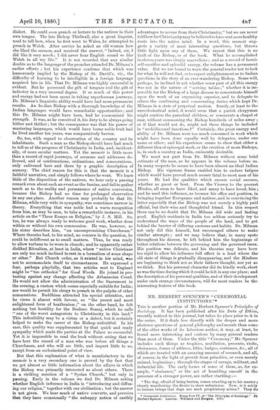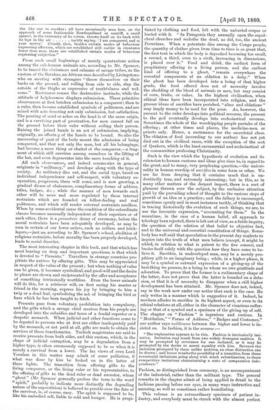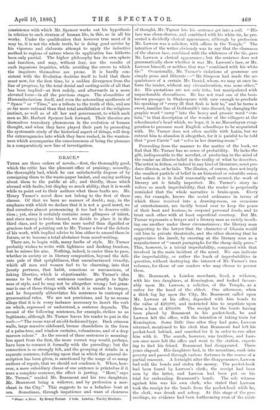MR. HERBERT SPENCER'S "CEREMONIAL INSTITUTIONS."*
Tins is another portion of Mr. Herbert Spencer's Principles of Sociology. It has been published after his Data of Ethics,. recently noticed in this journal, but takes its place prior to it in the series. If it deals less directly with the deeper and more abstruse questions of general philosophy and morals than some of the other works of its laborious author, it may, at least, be found more interesting and curious by many general readers than most of them. Under the title "Ceremony," Mr. Spencer includes such things as trophies, mutilation, presents, visits,. obeisances, forms of address, titles, badges, costumes, &c., all of which are treated with an amazing amount of research, and all, of course, in the light of growth from primitive, or even merely animal, beginnings ; through the stages of savage, militant, and industrial life. The early forms of some of them, as, for ex- ample, "obeisance," or the act of humbling oneself in the presence of a stronger power, are rather startling :— "The dog, afraid of being beaten, comes crawling up to his master; clearly manifesting the desire to show submission. Now, is it solely to human beings that dogs use such propitiatory action ? They do.
• Ceremonial Institutions. Being Part IV. of '4 The Principles of Sociology." By Herbert Spencer. London Williams and Norgate. 1879.
the like one to another ; all have occasionally seen how, on the approach of some fashionable Newfoundland or mastiff, a small spaniel, in the extremity of its terror, throws itself on its back with its legs in the air tacitly saying, I am conquered, and at your mercy.' Clearly, then, besides certain modes of behaviour expressing affection, which are established still earlier in creatures lower than man, there are established certain modes of behaviour expressing subjection."
From such small beginnings of merely spontanious action among the sub-human animals are, according to Mr. Spencer, to be traced the obeisances and salaams of savage tribes, as the custom of the Bataka.s, an African race described by_Livingstone, who on meeting with strangers "throw themselves on their backs on the ground, and rolling from side to side, slap the outside of the thighs as expressive of truthfulness and wel- come." Resistance rouses the destructive instincts, while the attitude of helplessness displays submission. These primitive observances at first betoken submission to a conqueror; then to a ruler, then become established symbols of politeness, and are mixed with acts denoting not only submission, but satisfaction. The pouring of sand or ashes on the head is of the same origin, and is a surviving part of prostration, for men cannot fall on the ground before their ruler without soiling their person. Raising the joined hands is an act of submission, implying, originally, an offerin g of the hands to be bound. So also the uncovering of part of the body meant the admission of being conquered, and that not only the man, but all his belongings, had become a mere thing or chattel of the conqueror,—a frag- ment of which still survives among ourselves in the lifting of the hat, and even degenerates into the mere touching of it.
All such observances, and indeed ceremo nies in general, originate in "militancy," and develope along with the type of society. As militancy dies out, and the social type, based on individual independence and self-respect, with voluntary co- operation, progresses, there will come, and is now growing, a gradual disuse of obeisances, complimentary forms of address, titles, badges, &c.; while the manner of men towards each other will be more and more regulated by those internal restraints which are founded on fellow-feeling and real politeness, and which will render external restraints needless. When by some accidental cause the condition of the subordinate classes becomes unusually independent of their superiors or of each other, there is a premature decay of ceremony, before the moral restraints have been adequately developed, as may be seen in certain of our lower orders, such as colliers and brick- layers,—just as, according to Mr. Spencer's school, abolition of religious restraints, before morality has been properly developed, leads to social disorder.
The niost interesting chapter in this book, and that which has most bearing on deep and important questions, is that which is devoted to "Presents." Travellers in strange countries pro- pitiate the natives by offering gifts. This may be appreciated in respect of the value of the present ; but when nothing of value can be given, it becomes symbolical, and good-will and the desire to please are shown and reciprocated by the offer and acceptance of something intrinsically worthless. Even the lower animals will do this, for a retriever will, on first seeing his master or friend in the morning, express his joy by bringing to him a twig or a dead leaf, symbolising the act of bringing the bird or hare which he has been taught to fetch.
Presents pass from voluntary prohibition into compulsory, and the gifts which a savage chief receives from his people are developed into the subsidies and taxes of a feudal superior or a despotic monarch. When judicial and other functions come to be deputed to persons who at first are either inadequately paid by the monarch, or not paid at all, gifts are made to obtain the services of these functionaries. Turkish magistrates are said to receive presents from both sides, and this custom, which, in the shape of judicial corruption, may be a degradation from a higher type, is often erroneously supposed to be so when it is merely a survival from a lower. The lax views of even Lord Verulam in this matter may admit of some palliation, if what was done by him be looked on in the latter of these lights. The transition from offering gifts to the living conqueror, or the living ruler or his representative, to the offering of gifts to the dead ruler or dead ancestor, whose "ghost" (Mr. Spencer generally prefers the term to the word
"spirit," probably to indicate more distinctly the degrading nature of the superstition) is believed to preside over the fate of the survivor, is, of course, easy. The spirit is supposed to be, like his embodied self, liable to cold and hunger. He is propi- tiated by clothing and food, left with the unburied corpse or buried with it. "In Patagonia they annually open the sepul- chral churches and reclothe the dead, as did, too, the ancient Peruvians. When a potentate dies among the Congo people, the quantity of clothes given from time to time is so great that, the first tent in which the body is deposited becoming too small, a second, a third, even to a sixth, increasing in dimensions, is placed over it." Food and drink, the earliest form of propitiatory offering to a living person, and the earliest kind of offering to a ghost, "remain everywhere the essential components of an oblation to a deity." When the ghost has been developed into a being of that higher grade, the food offered does not of necessity involve the shedding of the blood of animals or men, but may consist of corn, fruits, or cakes. In the highest civilisation, when ethical ideas have been incorporated into religion, and the grosser ideas of sacrifice have perished, "alma and oblations" may imply money to be used for the poor. As, however, the present to the ruler develops into political revenue, the present to the god eventually develops into ecclesiastical revenue. Sometimes the whole of the worshipping people partake of the offering ; at other times and places, the medicine-men or priests only. Hence, a sustenance for the sacerdotal class. The oblation of food (according to our author) has not yet died out in the civilised races, with the exception of the sect of Quakers, which is the least sacramental and ecclesiastical of the communities professing Christianity.
Such is the view which the hypothesis of evolution and its extension to human customs and ideas give rises to, in regard to the great, and to many, very perplexing question,—the univer- sality in human worship of sacrifice in some form or other. We are far from denying that it contains much that is un- doubtedly true, and extremely interesting; but in this, as in many other matters of the deepest import, there is a sort of glamour thrown over the subject, by the exclusive attention paid by the prevailing school of thought to the various steps of growth of an idea or a practice; and the fallacy is encouraged,
sometimes openly and in most instances tacitly, of thinking that in tracing historically the evolution of such things, we are, to
use the favourite expression, "accounting for them." In the meantime, in the case of a human belief, all approach to teleology been rejected, there is left out of view, as a futile inquiry, the question of the relation of that belief to objective fact, and to the universal and essential constitution of things. Some- body has well said that speculation in the present day neglects to inquire into the truth of what men believe (except, it might be added, in relation to what is patent to the five senses), and busies itself solely with the question how they have come to be- lieve it. Sacrifice, in undeveloped man, may be a merely pro- pitiory gift to an imaginary being ; while, in a higher phase, it may be a symbol or outward expression of a giving-up of the best thing we possess, to a being to whom we owe gratitude and adoration. To prove that the former is a rudimentary shape of the latter, does not prove that the latter is founded on a delu- sion, or that it is of necessity to disappear when a still higher development has been attained. Mr. Spencer does not, indeed, say in the work now under our notice that such is the case. He only writes in a manner which is suggestive of it. Indeed, he
nowhere alludes to sacrifice in its highest aspect, or even to its ethical relations at all, either in the character of vicarious suffer- ing or that of a symbol and a specimen of the giving up of self. The chapter on " Fashion " is ingenious and curious. In "Mutilation," "Forms of Address," "Badges and Costumes," our author says unlikeness between the higher and lower is in- sisted on. In fashion, it is the reverse :—
"The explanation appears to be this. Fashion is intrinsically imi- tative. Imitation may result from two widely divergent motives. It may be prompted by reverence for one imitated, or it may be prompted by the desire to assert equality with him. Between the imitation prompted by these unlike motives, no clear distinction can be drawn ; and hence results the possibility of a transition from those reverential imitations going along with much subordination, to those competitive imitations characterising a state of comparative inde- pendence."
Fashion, as distinguished from ceremony, is an accompaniment of the industrial, rather than the militant type. The general remarks in the chapter admit of being applied in detail to the fashions passing before our eyes, in many ways instructive and amusing, as well as sometimes rather humiliating.
This volume is an extraordinary specimen of patient in- dustry, and everybody must be struck with the almost perfect consistence with which Mr. Spencer works out his hypothesis in relation to each stratum of human life, in this, as in all his works. Under the qualification that however true most of it may be, it is not the whole truth, he is doing good service by his vigorous and elaborate attempt to apply the inductive method to regions of nature where its application has hitherto been only partial. The higher philosophy has its own sphere and function, and may, without fear, use the results of such ingenious inquiries, while avoiding the errors to which the inquirers themselves are prone. It is hardly con- sistent with the Evolution doctrine itself to hold that there must now, for the first time, be a sudden divergence from the line of progress, by the total denial and casting-aside of all that has been implied—at first rudely, and afterwards in a more elevated form—in all the previous stages. The absurdities of Humanitarianism itself, and even the astounding apotheosis of " Space " or "Time," are a tribute to the truth of this, and are so far more rational than that total annihilation of the religious instinct, as well as of all law and government, to which such men as Mr. Herbert Spencer look forward. Their theories are themselves transitory phenomena in the evolution of human thought, and when they have played their part by promoting the systematic study of the historical aspect of things, will drop the extravagancies into which they have rushed, in the wanton- ness which accompanies the consciousness of being the pioneers in a comparatively new line of investigation.




































 Previous page
Previous page